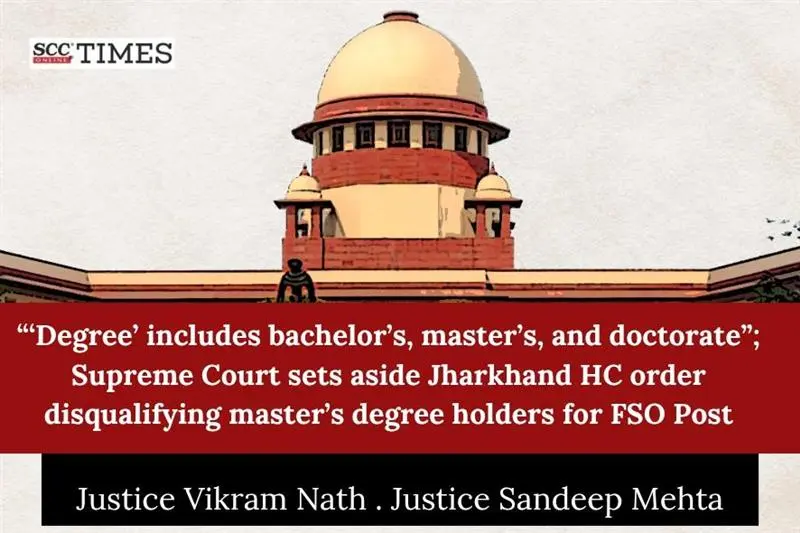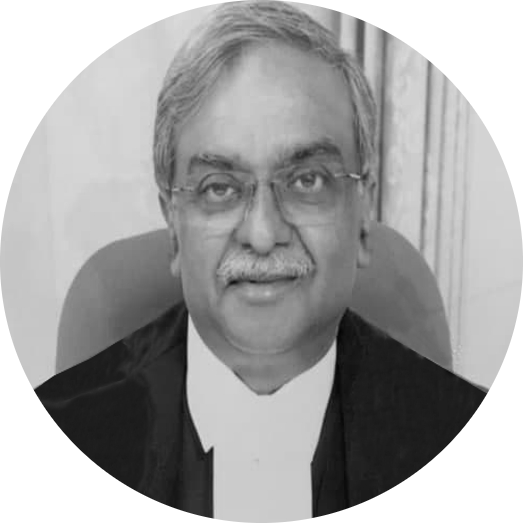Supreme Court: In an appeal seeking a direction upon the respondents to consider the candidature of the appellants for the appointment as Food Safety Officers (‘FSO’), pursuant to the notification dated 7-10-2015 issued by the Jharkhand Public Service Commission (‘JPSC’) upon the requisition of the State of Jharkhand, the division bench of Vikram Nath and Sandeep Mehta*, JJ. held that the appellants who possessed post-graduate degrees in subjects covered under Clause 2.1.3 of the Food Safety and Standard Rules, 2011 (‘FSS Rules’) were unquestionably qualified for the post of FSO under the subject advertisement. Therefore, the Court concluded that the impugned judgments, of the Division Bench of the High Court and Single Bench of the High Court, did not stand to scrutiny and were liable to be set aside.
However, the Court concluded that the prayer made by the appellants to appear in the interview under the Advertisement issued by JPSC, cannot be acceded to as they did not apply under this advertisement.
Background
The appellants had the qualifications of post-graduation in science with microbiology, food, and technology subjects. They had applied for the post of FSO in pursuance of the Advertisement issued by JPSC, wherein the educational qualification for the said post was stipulated. The appellants were declared successful in the written examination and were called for interviews by JPSC. However, during the recruitment process, they were disqualified on the ground that the master’s degree possessed by the appellants could not be treated as a valid educational qualification for the purpose of selection to the post of FSO in the State of Jharkhand.
Being aggrieved, the appellants invoked the writ jurisdiction of the Jharkhand High Court seeking a mandate to the authorities concerned to conduct the interview of the appellants and to declare the result. A prayer was also made to direct the respondents to accept the master’s degree held by the appellants as a valid qualification for appointment to the post of FSO, in pursuance of the subject advertisement. The Single Judge dismissed the writ petition.
Being aggrieved, the appellants preferred an intra-court appeal to the Division Bench of the High Court. In the said appeal, the University Grants Commission (‘UGC’), filed a counter affidavit affirming that ‘degree’ would include any degree in the specified subjects, either Bachelor’s or Master’s. Thereafter, a supplementary affidavit was filed by the UGC, wherein it was submitted that the degree would mean any such degree previously approved by the Central Government to be specified in this regard. The Division Bench dismissed the intra-court appeal, preferred by the appellants, holding that the appellants did not possess a degree of graduation in terms of the subject advertisement. Furthermore, it held that the degrees of post-graduation held by the appellants in the fields of Microbiology/Food Science and Technology would not meet the qualification criteria in terms of the subject advertisement. The aforesaid judgment of the High Court in the intra-court appeal is the subject matter of challenge in this appeal by special leave.
Analysis and Decision
The Court noted that it was not in dispute that the appellants had laid a claim for the posts in question by disclosing that they possessed master’s degrees in microbiology, Food Science, and Technology subjects. Thus, there was no ambiguity or misrepresentation by the appellants regarding their educational qualification at the time of applying in the subject recruitment process. The respondent-recruiting authority had consciously accepted the application forms of the appellants, and pursuant to their performance on merit, the appellants were called for an interview. It was at this stage that the appellants were declared disqualified and ousted from the selection process on the premise that they were holding master’s degrees in the relevant subject(s), whereas the rules and the advertisement had clearly provided that the required degree should be at the graduate level only.
After examining Sections 37, 91, and 94 of the Food Safety and Standards Act, 2006 (‘FSS Act’) governing the qualifications and service conditions for the post of FSO, the Court emphasised that the prescription of qualifications for the post of FSO was within the exclusive domain of the Central Government, and the power to appoint was vested in the Commissioner of Food Safety. Thus, the scope of powers to be exercised by the State Government was limited only to the extent of formulating the modalities for carrying out the functions and duties assigned to the FSO under the FSS Act. The Court concluded that the FSS Act did not permit the State Government to transgress into the field of prescribing the qualifications for the posts of FSO, which lay within the exclusive domain of the Central Government.
The Court noted that the Central Government, while exercising powers under Section 91 of the FSS Act notified the FSS Rules wherein, the educational qualifications for the post of the FSO have been provided. The Court mentioned that these Rules have been adopted by the State of Jharkhand mutatis mutandis.
Whether the term ‘degree,’ as mentioned in the rules and the recruitment notification, should be restricted to a ‘bachelor’s degree’ or whether it would also include a ‘master’s degree.’
The Court noted that the term ‘degree’ was defined under Section 22(3) of the University Grants Commission Act, 1956 (‘UGC Act’), which states that ‘degree’ meant the ‘Bachelor’s Degree,’ ‘master’s degree,’ and ‘Doctorate Degree.’ Thus, wherever the word ‘degree’ was used, unless a specific exclusion was provided, it would include all three.
In the present case, the respondents had disqualified the appellants on the ground that they held master’s degrees in different subjects, whereas, according to Clause 2.1.3 of the FSS Rules and the subject advertisement, the educational qualification of a master’s degree was only recognised in the ‘Chemistry’ subject. For all other subjects, only a graduation degree was considered the qualifying criterion.
The Court explained that there was no ambiguity whatsoever in the FSS Rules or the subject advertisement that could exclude the master’s degree in subjects other than Chemistry, as being a valid qualification. The special reference to the master’s degree in the said Rule was only for those who had acquired their degree in Chemistry, for whom the minimum qualifying criterion was a master’s degree in chemistry. However, regarding other subjects, a person holding any degree, whether a graduation or post-graduation, would be equally qualified for the post in question.
Therefore, the Court concluded that if a candidate, having undertaken a degree course in the ‘Chemistry’ subject, desired to apply for the post of FSO, he must have possessed a master’s degree in that subject. However, if a candidate had taken college education in the subjects of Food Technology, Dairy Technology, Biotechnology, Oil Technology, Agricultural Science, Veterinary Science, Biochemistry, or Microbiology, then such a candidate would have been qualified for the FSO post, provided he held any one of the degrees, i.e., either a Graduation, Post-Graduation, or Doctorate degree in any of these subjects.
The Court found no logic or rationale behind excluding candidates holding Master’s or Doctorate degrees in these subjects from claiming the post of FSO, as such an interpretation would have been unjust, arbitrary, and unconstitutional.
The Court also noted that, in order to resolve the prevailing confusion, the Central Government had amended the ‘FSS Rules’ in the year 2022, providing that a ‘Bachelor’s Degree,’ ‘Master’s Degree,’ or ‘Doctorate Degree’ in Food Technology, Dairy Technology, Biotechnology, Oil Technology, Agricultural Science, Veterinary Sciences, Biochemistry, Microbiology, or a Master’s Degree in Chemistry, or a Degree in Medicine, would be a valid qualification for the post of FSO.
The Court held that the appellants who possessed post-graduate degrees in subjects covered under Clause 2.1.3 of the FSS Rules, were unquestionably qualified for the post of FSO under the subject advertisement. Therefore, the Court concluded that the impugned judgments, of the Division Bench of the High Court and Single Bench of the High Court, did not stand to scrutiny and were liable to be set aside.
To do complete justice, and in case vacancies did not exist in the recruitment process of 2016, the Court directed the respondents to create supernumerary posts to accommodate the appellants. The appellants were to be allowed to partake in the recruitment process from the stage at which they were disqualified, i.e., from the interview stage. In the event that, after undergoing interviews, the appellants succeeded and were placed on a par with or higher in merit compared to the last successful candidate in the category, they were to be offered appointment, which would be effective from the date of publication of the first select list in the recruitment process of 2016.
The Court clarified that, since the selected candidates had never been impleaded or heard in the proceedings before the High Court or in this Court, an appropriate direction had to be given to ensure that their seniority position was not disturbed at this belated stage. Therefore, the successful candidates from amongst the appellants were to be placed below the last candidate selected and appointed in the subject selection process.
The Court further clarified that, if the appellants succeeded and were offered appointment, they would not be entitled to back wages. However, they would be entitled to all service benefits on a notional basis.
CASE DETAILS
|
Citation: Appellants : Respondents : |
Advocates who appeared in this case For Petitioner(s): For Respondent(s): |
CORAM :








